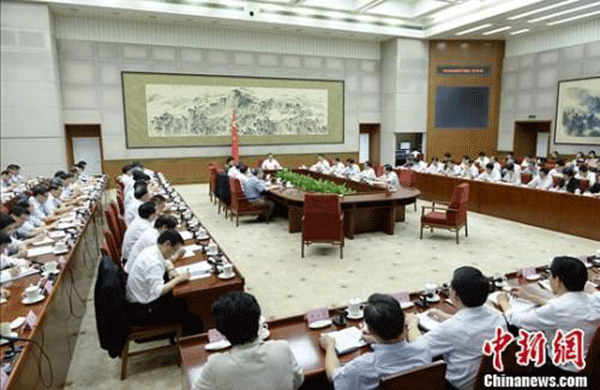 |
|
The Communist Party of China (CPC) convenes the fifth plenary session of its 18th Central Committee on Monday.[Photo/Chinanews.com] |
Maintaining the economic growth rate is widely believed to top a list of 10 major tasks in China's new development blueprint.
This strategy is being reviewed by the nation's top leaders from Monday to Thursday in Beijing before being submitted to the top legislature.
The Communist Party of China is holding its Central Committee plenum this week to come up with a proposal for the 13th Five-Year Plan(2016-20).
Against the backdrop of a lingering slowdown in the past two years, top leaders' concern about the economy's continuing growth is fully justifiable, economists said.
The GDP growth target for the next five years is one of the key issues being debated by economists, and is almost certain to be included in the Five-Year Plan.
But an official announcement will not be made until the plan is ratified by the annual session of the National People's Congress, the nation's top legislature, in March.
Wang Jun, a researcher at the China Center for International Economic Exchanges, a think tank in Beijing, said a growth target between 6.5 and 7 percent for 2016-20 is needed to achieve the goal of doubling GDP and per capita income from the 2010 levels by 2020.
The economy slipped to its lowest growth since 2009 in the third quarter. On Friday, the central bank cut benchmark interest rates for the sixth time since November and lowered the reserve requirement ratio to shore up the economy.
Major goals for the next five years also include promoting innovation, optimizing the economic development method and accelerating reform, People's Daily said on Monday.
Xia Guang, director of the Policy Research Center for Environment and Economy at the Ministry of Environmental Protection, said the next five years will be a promising period when rapid improvement will be seen in environmental protection nationwide.
China issued the air pollution control action plan in 2013 and water pollution action plan this year and declared war on pollution in March. Xia said this makes the 13th Five-Year Plan the start of a protracted and united campaign against pollution, with ministries making coordinated efforts to reduce emissions.
For example, the Ministry of Finance has regulated the allocation of special funds for related projects, and the Ministry of Housing and Urban-Rural Development has outlined projects to clean up rivers in cities, Xia said.
Stabilizing economic growth is also crucial to realizing other goals such as poverty elimination, which was omitted from the major targets for the 12th Five-Year Plan (2011-15).
China has set a goal to lift 70 million people above the poverty line by 2020, President Xi Jinping said in Beijing in mid-October.
As of the end of last year, 70.17 million people in rural areas were living below the national poverty line of 2,300 yuan ($376) in annual income.
Contact the writers through [email protected]
